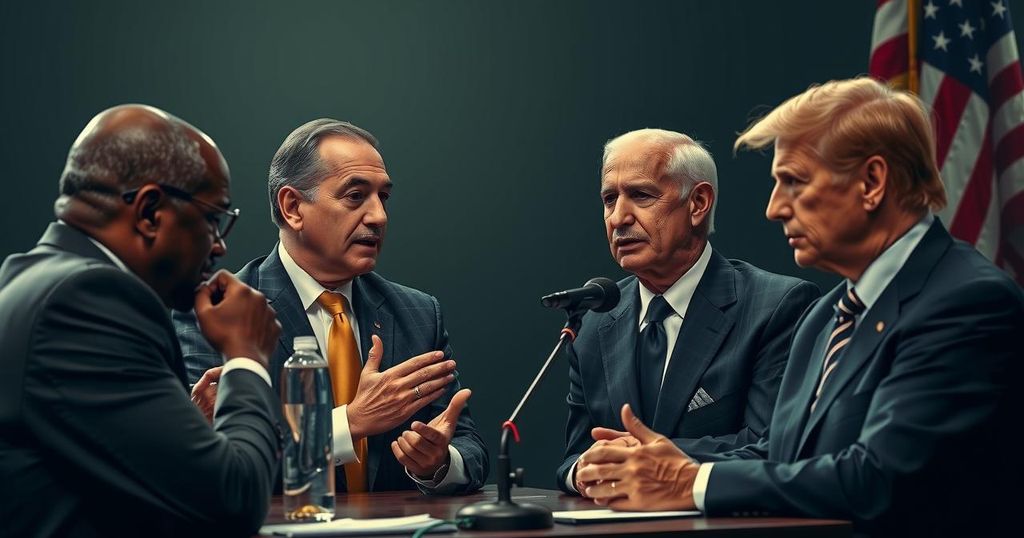U.S. Lawmakers Seek to Block $1.2 Billion Arms Deal with UAE Over Sudan Controversy

Two U.S. lawmakers are attempting to block a $1.2 billion arms deal with the UAE, citing the country’s support of Sudan’s Rapid Support Forces amidst ongoing violence. Senator Van Hollen and Representative Jacobs argue that the deal should not proceed without assurance that the UAE is not supplying arms to the RSF. Despite bipartisan support, the resolutions face potential challenges in Congress due to the UAE’s status as a key ally.
A bipartisan initiative led by U.S. Democratic lawmakers seeks to block a proposed $1.2 billion arms deal between the United States and the United Arab Emirates (UAE). Senators Chris Van Hollen and Representative Sara Jacobs have introduced resolutions that require the Biden administration to certify that the UAE is not supplying arms to the Rapid Support Forces (RSF) in Sudan before any such sale can proceed. Lawmakers assert that supplying arms to the UAE undermines efforts to address the escalating humanitarian crisis in Sudan, where the RSF is implicated in ongoing violence and conflict.
Senator Van Hollen articulated the gravity of the situation, emphasizing that partnering with the UAE must not come at the expense of ignoring its role in exacerbating the turmoil in Sudan. United Nations monitors have validated concerns that the UAE has provided arms to the RSF, accusations that the UAE categorically denies. Their position remains that while they did supply arms prior to the war, they ceased all such actions following a specific date in April 2023.
Representative Jacobs, having recently interacted with Sudanese refugees, has expressed that engaging in further arms transactions without scrutinizing the UAE’s actions could worsen the humanitarian crisis. Despite the critical stance from lawmakers, experts predict these resolutions may struggle to gain traction in Congress, where the UAE is regarded as a key ally, particularly following President Biden’s formal acknowledgment of it as a “major defense partner” earlier this month.
The intricate dynamics of U.S.-UAE relations and the geopolitical implications of the arms deal present complex challenges. The proposed deal includes a range of military equipment, and lawmakers are aiming to direct attention towards Sudan’s deteriorating situation through their legislative efforts. The outcome of this endeavor will unfold in the context of ongoing diplomatic relations and humanitarian concerns in Sudan.
The proposed arms deal between the United States and the United Arab Emirates has elicited strong reactions from certain members of Congress in light of the UAE’s alleged involvement in Sudan’s ongoing conflict. This arms deal has raised ethical questions as the RSF has been accused of committing human rights violations in Sudan, a country facing a significant humanitarian crisis. Politicians are urging the Biden administration to take a firm stance by ensuring that the UAE is not contributing to the destabilization of Sudan through arms supply. This situation highlights the challenging balance U.S. lawmakers must maintain in fostering strategic alliances while addressing moral obligations in international conflict. The geopolitical landscape complicates matters further, as the UAE is viewed as a vital ally in the Middle East. However, the pressures from lawmakers may prompt a reevaluation of this relationship if the UAE continues to support groups implicated in creating instability and violence in Sudan. With the involvement of congressional resolutions, this issue is garnering more significant media attention and public discourse.
The push by U.S. lawmakers to block the arms deal with the UAE underscores the complex interplay between international relations and ethical governance. As concerns mount regarding the UAE’s role in the conflict in Sudan, the bipartisan initiative by Senator Van Hollen and Representative Jacobs seeks to impose accountability on U.S. foreign policy decisions. While prospects for success in Congress appear limited, the efforts highlight growing frustration over foreign partnerships that may conflict with humanitarian principles and global stability. The unfolding situation in Sudan serves as a stark reminder of the responsibility that comes with arms trade and international alliances.
Original Source: www.dabangasudan.org








